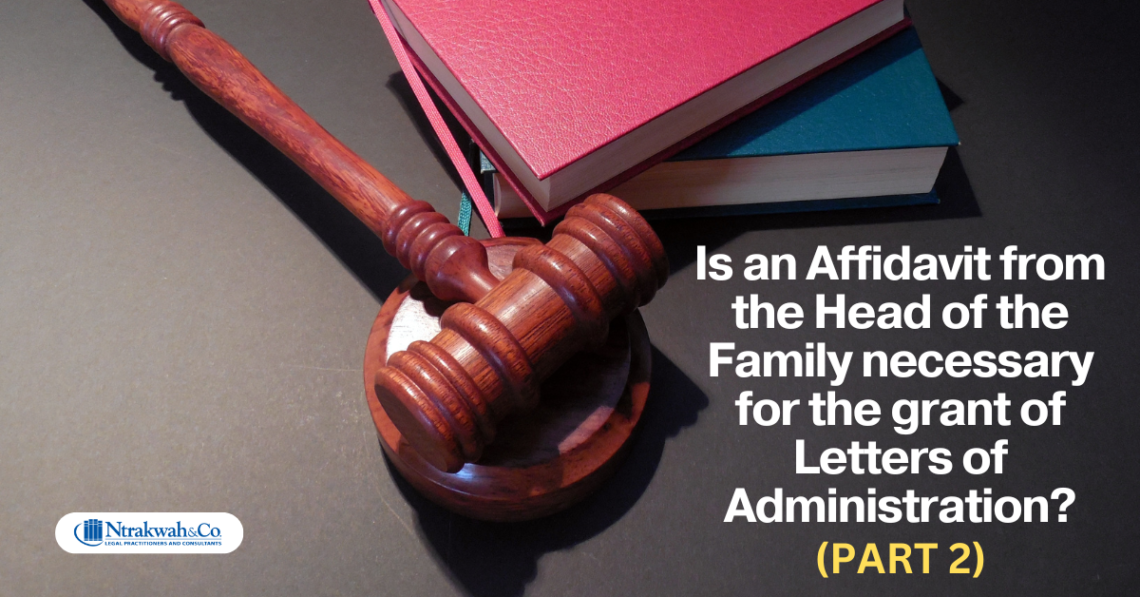
In applying for the Letters of Administration (LA), Order 66 rule 8(1) of C.I. 47, states that “every application for the grant of probate or letters of administration shall be supported by an affidavit sworn by the applicant and with such other documents as the Court may require.” This “such other documents” that the court may require has neither been stated in C.I. 47 nor the Administration of Estates Act, 1961 (Act 63). The requirement for any other documents is therefore at the sole discretion of the court.
On page 180 of the book, “A Practical Guide to Civil Procedure in Ghana” by His Lordship, the late Samuel Marful-Sau (JSC), he states that:
“Every application for the grant of probate and letters of administration is by a Motion Ex Parte supported by an affidavit and a set of statutory forms and such other documents that the court may require.
His Lordship on page 181 of the book goes on to list the requirements for the grant of an application for LA as follows:
a. Motion Ex Parte
b. Affidavit by Applicants-identifying the deceased, naming the applicants and their interest in the estate; place of abode of the deceased; date and place of death; whether married and survived by spouses; names of children and their ages.
c. Affidavit of head of family confirming the facts as contained in the affidavit of the applicants.
d. Oath of Administrators not with Will Annexed- this is a statutory form to be completed by the applicants.
e. Declaration of movable and immovable property of the testator or intestate, a statutory form to be completed by applicants.
f. Death certificate or any evidence of death.”
Some courts require that all the documents stated above be attached to the application before the application is granted. Some other courts require all the above except the affidavit of the head of the family confirming the facts as contained in the affidavit of the applicants. I am well aware of a court where the registrar is under strict instructions by the judge not to accept any application for filing without the affidavit of the head of the family. The courts have a wide discretion under section 79 of Act 63 to grant LA and the absence of an affidavit by the head of the family does not nullify the application.
It is my humble opinion that the requirement of an affidavit by the head of the family confirming the facts as contained in the affidavit of the applicants can be a very tricky hurdle for spouses and children of the deceased to jump. This requirement does not only frustrate the applicants but also defeats the purpose and intention of PNDCL 111.
Some heads of family refuse to co-operate in the application for the grant of LA because they simply do not like the spouse or children of the deceased and would do anything to frustrate the spouse or children. Sometimes, these heads of family only appear when their family member dies just to wreak havoc on the surviving spouse and children, as it was in the case I handled.
In the case I handled, the head of the family sought to have the LA granted to the deceased’s spouse nullified because she had not obtained an affidavit from him confirming the facts as contained in her affidavit for the grant of the LA. The head of the family was surprised that the court had granted the surviving spouse LA without an affidavit from him as head of the family of the deceased.
The court agreed with our submission that the surviving spouse was the highest priority of the persons entitled to the grant of LA and that the affidavit from the head of the family was not a mandatory document required by the court. As such the court refused to nullify the LA granted to the surviving spouse.
The requirement for the courts to grant LA even in the absence of an affidavit by the head of the family confirming the facts contained in the affidavit of the applicants has judicial backing in the case of Progressive Modern Company Ltd v. Esther Bonsu and Two Others [2008] MLRG 65 CA.
I am of the firm belief that the courts should not include an affidavit of the head of the family as a requirement before granting LA to the persons to whom LA could be granted by law. This would inevitably prevent situations where heads of families put the spouse and children of the deceased through further turmoil by making unreasonable demands on them or by refusing to sign the affidavit.
Undoubtedly, a court can grant LA without an affidavit from the head of the family as stated in Progressive Modern Company Ltd v. Esther Bonsu and Two Others, above. The removal of this requirement of an affidavit from the head of the family from the lists of documents a court requires would ensure that the purpose and intent of PNDCL 111 are truly achieved.
Alexander Dodoo
Associate






